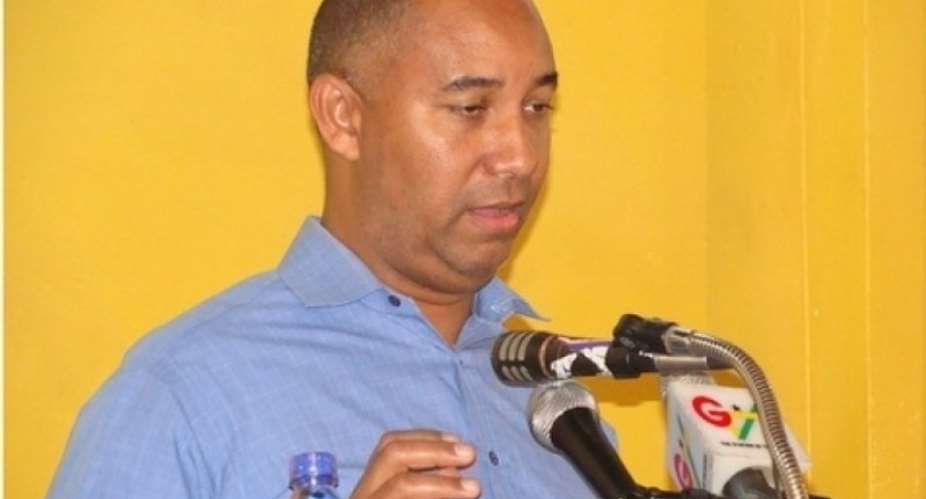The Ghana National Petroleum Corporation (GNPC) has strongly defended its investments in the last few years.
The Chief Executive Officer of GNPC Alex Mould has described such investments as strategic and forward looking.
Mr. Mould insists that GNPC is an industry enabler and gas aggregator in Ghana, hence the need for the corporation to invest into the power sector with a plan to use gas which GNPC will produce, to power electricity generating plants in the country.
Some lawmakers have accused the corporation of veering off its core mandate by undertaking projects that have nothing to do with oil and gas. The minority lawmakers have threatened to block the passage of GNPC’s 2016 programme of activities over what they term questionable investments.
The US$550 million Quantum Power Re-gasification project and the US$ 100 million Karpower guarantees signed by GNPC have heavily been criticized.
However, speaking at this week’s African Oil and Power Conference held in Cape Town, South Africa the GNPC boss launched a spirited defense insisting GNPC, like any other state oil company must actively support the energy value chain, and that this support must be done in addition to playing a lead role in the exploration and production of hydro carbons.
“In a developing country context, the national oil company must be the pivot for energy industry development. The national oil company must lead with investments in strategic energy infrastructure,” Mould stated.
He said GNPC is enabling investments across the energy value chain to support the development of a vibrant energy sector in Ghana. Using the success stories of Angola’s national oil companies, the GNPC Chief Executive said: “Sonangol and Sonatrach have made significant progress in this regard. In Angola, Sonangol has championed the Angolanization policy, in place since 2002, and is leading ever greater involvement of Angolans in the oil and gas sector.”
Having gained the momentum with the Angolan example, Mr. Alex Mould told his audience: “In Ghana, GNPC is leading similar efforts. GNPC is positioning itself as an enabler of strategic investments in Ghana’s energy sector. This is in line with our mandate to: undertake the exploration, development, production and disposal of petroleum, as well as our role as the national Gas Sector Aggregator.”
Explaining why GNPC was involved in the US$ 550 million Quantum Project, Mr. Mould said the Corporation had to go into that project in order to provide another source of gas for Ghanaians, since the expected gas from Sankofa Gye Nyame will not be enough for the country. GNPC is therefore working with a private sponsor to build a Liquefied Natural Gas import terminal. The terminal, with a capacity of 500mmscf/d will receive, store, re-gasify Liquefied Natural Gas and discharge the gas through pipelines to power energy generating plants in the Tema enclave.
“This is a strategic investment to improve Ghana’s energy security,” he stated. Mr. Mould went further to rationalize the decision of his corporation being a guarantor for the Electricity Company of Ghana, leading to the development of the Karpower barge.
In confirmation of the prudence in that decision, he indicated that GNPC is working on another guarantee to enable the second KarPower barge to be delivered for Ghana. He said: “Consistent with our gas aggregator role, GNPC provided financial guarantee to enable the deployment of a 450MW power barge in Ghana.
Half of this capacity has already been added to the national grid, which has helped alleviate the power shortage in the country. The second half is expected to be deployed this year”.
Unfazed by the criticisms that the corporation is venturing into the power sector instead of staying within the petroleum industry, Mr. Mould announced a new investment that the corporation will be undertaking in the power sector. He hinted: “GNPC is also considering the feasibility of rehabilitating an existing barge owned by the Corporation, to generate up to 125MW in the first phase. If feasible, planned expansion may increase the capacity to about 400MW.”





 'Kill whoever will rig Ejisu by-election' – Independent Candidate supporters inv...
'Kill whoever will rig Ejisu by-election' – Independent Candidate supporters inv...
 Ashanti Region: ‘Apologize to me for claiming I owe electricity bills else... – ...
Ashanti Region: ‘Apologize to me for claiming I owe electricity bills else... – ...
 Ghana is a mess; citizens will stand for their party even if they’re dying — Kof...
Ghana is a mess; citizens will stand for their party even if they’re dying — Kof...
 Internet shutdown an abuse of human rights — CSOs to gov't
Internet shutdown an abuse of human rights — CSOs to gov't
 Free SHS policy: Eating Tom Brown in the morning, afternoon, evening will be a t...
Free SHS policy: Eating Tom Brown in the morning, afternoon, evening will be a t...
 Dumsor: A British energy expert 'lied' Ghanaians, causing us to abandon energy p...
Dumsor: A British energy expert 'lied' Ghanaians, causing us to abandon energy p...
 What a speech! — Imani Africa boss reacts to Prof. Opoku Agyemang’s presentation
What a speech! — Imani Africa boss reacts to Prof. Opoku Agyemang’s presentation
 Dumsor: Tell us the truth — Atik Mohammed to ECG
Dumsor: Tell us the truth — Atik Mohammed to ECG
 Dumsor: Don't rush to demand timetable; the problem may be temporary — Atik Moha...
Dumsor: Don't rush to demand timetable; the problem may be temporary — Atik Moha...
 Space X Starlink’s satellite broadband approved in Ghana — NCA
Space X Starlink’s satellite broadband approved in Ghana — NCA
